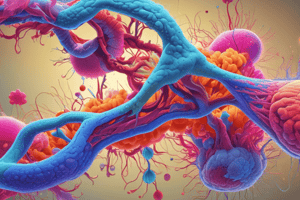Podcast
Questions and Answers
What is the primary role of p53 as a tumor suppressor protein?
What is the primary role of p53 as a tumor suppressor protein?
- Inducing apoptosis in all cells
- Activating cyclin B1/Cdk1 for cell cycle progression
- Regulating the expression of pro-apoptotic genes
- Preventing cancer development by repairing DNA or inducing apoptosis (correct)
Which process is primarily regulated by p53 in response to cellular stress?
Which process is primarily regulated by p53 in response to cellular stress?
- Cellular division
- Protein synthesis
- Metabolism
- Apoptosis (correct)
Which protein does 14-3-3σ sequester in the cytoplasm to prevent mitotic activation?
Which protein does 14-3-3σ sequester in the cytoplasm to prevent mitotic activation?
- GADD45
- BAX
- p53
- Cyclin B1/Cdk1 (correct)
What happens when p53 detects severe DNA damage that cannot be repaired?
What happens when p53 detects severe DNA damage that cannot be repaired?
Which gene is known for promoting DNA repair processes regulated by p53?
Which gene is known for promoting DNA repair processes regulated by p53?
What is the function of BAX in the apoptotic pathway activated by p53?
What is the function of BAX in the apoptotic pathway activated by p53?
What percentage of human cancers involve mutations in the TP53 gene?
What percentage of human cancers involve mutations in the TP53 gene?
How does p53 activate apoptosis transcriptionally?
How does p53 activate apoptosis transcriptionally?
What is the primary initiator caspase in the extrinsic apoptosis pathway?
What is the primary initiator caspase in the extrinsic apoptosis pathway?
Which of the following processes occurs during the execution phase of apoptosis?
Which of the following processes occurs during the execution phase of apoptosis?
What is the primary function of growth factor receptors?
What is the primary function of growth factor receptors?
Which proteins are considered pro-apoptotic regulators in the regulation of apoptosis?
Which proteins are considered pro-apoptotic regulators in the regulation of apoptosis?
What is the outcome when caspase-8 cleaves Bid in the extrinsic pathway?
What is the outcome when caspase-8 cleaves Bid in the extrinsic pathway?
Which type of growth factor receptor is most commonly associated with tyrosine kinase activity?
Which type of growth factor receptor is most commonly associated with tyrosine kinase activity?
Which cellular event is a hallmark of apoptosis?
Which cellular event is a hallmark of apoptosis?
What happens during the dimerization step of growth factor receptor activation?
What happens during the dimerization step of growth factor receptor activation?
In many cancers, dysregulation of which gene can prevent apoptosis and support tumor survival?
In many cancers, dysregulation of which gene can prevent apoptosis and support tumor survival?
What is the primary consequence of mutations in growth factor receptor pathways?
What is the primary consequence of mutations in growth factor receptor pathways?
What is a common receptor implicated in non-small cell lung cancer and colorectal cancer?
What is a common receptor implicated in non-small cell lung cancer and colorectal cancer?
What is the role of IAPs (Inhibitors of Apoptosis Proteins) in apoptosis regulation?
What is the role of IAPs (Inhibitors of Apoptosis Proteins) in apoptosis regulation?
Which downstream signaling pathway is NOT typically triggered by activated growth factor receptors?
Which downstream signaling pathway is NOT typically triggered by activated growth factor receptors?
What is the result of macrophages or neighboring cells phagocytosing apoptotic bodies?
What is the result of macrophages or neighboring cells phagocytosing apoptotic bodies?
What mechanism is primarily involved in terminating the signaling of growth factor receptors?
What mechanism is primarily involved in terminating the signaling of growth factor receptors?
What therapeutic strategy is used for cancers with EGFR mutations?
What therapeutic strategy is used for cancers with EGFR mutations?
What leads to uncontrolled receptor activation in non-small cell lung cancer (NSCLC)?
What leads to uncontrolled receptor activation in non-small cell lung cancer (NSCLC)?
Which protein is initially activated by RAS-GTP in the MAPK/ERK pathway?
Which protein is initially activated by RAS-GTP in the MAPK/ERK pathway?
How do mutations in KRAS affect the MAPK/ERK pathway?
How do mutations in KRAS affect the MAPK/ERK pathway?
What mutation is associated with continuous activation of the RAF kinase in cancer?
What mutation is associated with continuous activation of the RAF kinase in cancer?
What is the role of PI3K in the PI3K/AKT pathway?
What is the role of PI3K in the PI3K/AKT pathway?
Which mutation leads to increased AKT signaling in cancer?
Which mutation leads to increased AKT signaling in cancer?
What is a function of the mTOR protein in the PI3K/AKT pathway?
What is a function of the mTOR protein in the PI3K/AKT pathway?
What is the effect of PTEN loss on the PI3K/AKT pathway?
What is the effect of PTEN loss on the PI3K/AKT pathway?
What role does autophagy play in the metastasis of cancer cells?
What role does autophagy play in the metastasis of cancer cells?
What is the significance of epithelial-to-mesenchymal transition (EMT) in cancer?
What is the significance of epithelial-to-mesenchymal transition (EMT) in cancer?
How does autophagy assist cancer cells under hypoxic conditions?
How does autophagy assist cancer cells under hypoxic conditions?
What is a recent research focus regarding autophagy and cancer therapies?
What is a recent research focus regarding autophagy and cancer therapies?
In what way does autophagy act as a double-edged sword in tumor progression?
In what way does autophagy act as a double-edged sword in tumor progression?
What mechanism do aggressive tumors often utilize to survive therapy due to increased autophagy?
What mechanism do aggressive tumors often utilize to survive therapy due to increased autophagy?
What is the primary effect of hypoxia on autophagy in cancer cells?
What is the primary effect of hypoxia on autophagy in cancer cells?
What therapeutic strategy is being explored to combat drug resistance in aggressive cancers?
What therapeutic strategy is being explored to combat drug resistance in aggressive cancers?
Flashcards are hidden until you start studying
Study Notes
Growth Factors and Cancer
- Growth factor receptors are surface proteins binding specific signaling molecules essential for growth, differentiation, and survival.
Types of Growth Factor Receptors
- Tyrosine Kinase Receptors: Most prevalent; include EGFR, PDGF, and VEGFR.
- G-Protein-Coupled Receptors (GPCRs): Bind various ligands and are implicated in cancer progression.
- Serine/Threonine Receptors: Function through phosphorylation of serine or threonine residues affecting cellular signaling.
Mechanism of Growth Factor Receptors
- Binding of growth factors induces receptor dimerization, activating intracellular domains.
- Autophosphorylation occurs on specific tyrosine residues, launching downstream signaling pathways.
- Key pathways activated include MAPK/ERK, PI3K/AKT, and JAK/STAT, influencing proliferation and survival.
- Signaling termination happens via receptor internalization or regulatory protein deactivation, with mutations potentially leading to cancer.
Key Growth Factor Receptors in Cancer
- Epidermal Growth Factor Receptor (EGFR):
- Normal Role: Regulates cell growth and differentiation.
- Cancer Role: Mutations and overexpression linked to lung and colorectal cancers, leading to uncontrolled proliferation.
- Targeted Therapy: EGFR inhibitors like gefitinib and erlotinib are used against EGFR mutations.
Extrinsic Pathway of Apoptosis
- Begins with external death signals binding to death receptors.
- Forms the death-inducing signaling complex (DISC) which activates caspase-8, initiating apoptosis.
- Cross-talk with the intrinsic pathway promotes mitochondrial membrane permeabilization, leading to cell death.
Apoptosis Overview
- Cancer cells can undergo both apoptosis and necrosis; apoptosis is a regulated process, frequently disrupted in cancers.
- Many cancers exhibit dysregulation of apoptotic pathways, often linked to mutations in the p53 gene.
- Cancer therapies aim to enhance apoptosis by targeting inhibitors like Bcl-2.
Pathways Involved in Cancer
-
MAPK/ERK Pathway:
- Key for regulating cell growth and differentiation.
- Activation involves RAS and RAF proteins leading to increased cell proliferation.
- Dysregulation through KRAS or BRAF mutations commonly seen in cancers like pancreatic and melanoma.
-
PI3K/AKT Pathway:
- Critical for cell survival and metabolism.
- Activation occurs through growth factor-induced PI3K activity, leading to AKT activation.
- PIK3CA mutations and PTEN loss promote increased signaling, enhancing survival and growth.
Role of p53 in Cancer
- Known as the "guardian of the genome," p53 serves to prevent cancer progression by regulating the cell cycle and promoting apoptosis.
- Over 50% of human cancers harbor mutations in the TP53 gene, undermining its tumor-suppressive function.
- p53 can induce apoptosis through both transcriptional activation of pro-apoptotic genes and direct mechanisms.
Autophagy's Dual Role
- Autophagy can enhance metastasis by allowing cancer cells to survive adverse conditions during circulation and colonization.
- In hypoxic conditions, autophagy helps cells adapt by recycling damaged components, promoting survival under stress.
- Autophagy can create resistance against cancer therapies, and inhibitors are being tested to leverage this in treatment strategies.
Summary of Findings
- Autophagy's role shifts from a tumor suppressor in early stages to a promoter of growth and resistance in advanced tumors.
- Targeting the mechanisms of autophagy presents a promising therapeutic strategy for overcoming treatment resistance in aggressive cancers.
Studying That Suits You
Use AI to generate personalized quizzes and flashcards to suit your learning preferences.




